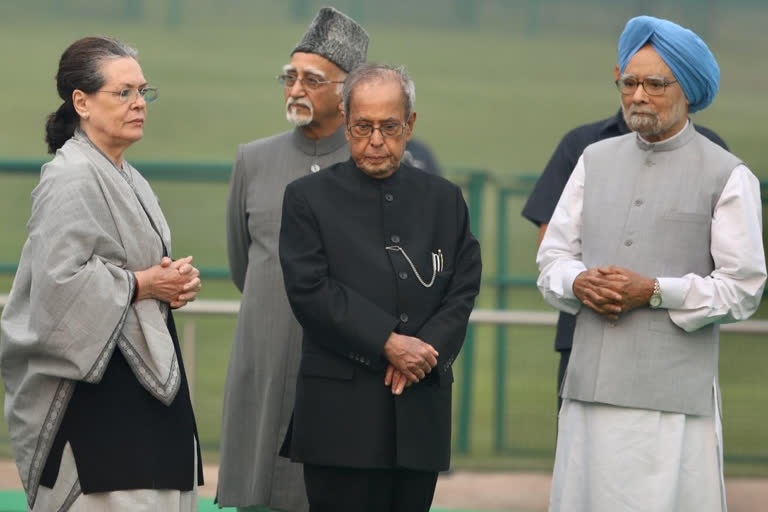Hyderabad: If Indira Gandhi is the ultimate female lead in the political celluloid of India, Manmohan Singh one of the most prominent male leads, and PV Narasimha Rao one of the most talked about characters, then Pranab Mukherjee is undoubtedly one of the best producers of the blockbuster.
India's politics today lost one of its able strategists, the country's first Bengali President and with him, the curtains were drawn on an exclusive Congress era.
Mukherjee was the Number-2 of Indira Gandhi. He was the Number-2 of former Prime Minister PV Narasimha Rao and had also played the role of Number-2 of Manmohan Singh. Pranab Mukherjee, the perpetual Number–2 of Indian politics.
From a non-descript village in Bengal to becoming the first citizen of the country, Pranab Mukherjee has always been the centre of all discussions. How Mukherjee shed the criticism that he never faced people, yet won from the Jangipur Lok Sabha seat in 2004, which he retained in 2009, is another fascinating tale. Very few remember that Mukherjee had earlier contested the Lok Sabha polls from the Bolpur seat in 1980, but lost to CPI(M)'s Saradish Roy.
But, the quintessential figure of Indian politics for over six decades charted his path from being 'Your Excellency', to a person with a difference. There were differences between Mukherjee as the President and Prime Minister Narendra Modi, but it was the 'Chanakya' of Indian politics who, in spite of being a ceremonial head of the government, created his own space and left his indelible mark on public life -- all while remaining within the limits of the Constitution. It was Mukherjee's journey of ascendancy from the perpetual Number–2 to Numero Uno.
Read:Soul of Constitution is still alive despite several amendments: Pranab Mukherjee
The uncanny way of working behind the scene, away from the glare, had been one of Mukherjee's trademark styles, which had eventually made him a household name in the Congress. He was never the hero, yet the main protagonist. A man who could take everyone 'on board' – from L K Advani to Lalu Prasad to Prakash Karat. Mukherjee was always a true pluralist, a man of great consensus.
With no political lineage, Pranab Mukherjee, a teacher and a journalist in the early days of his career, created his own space among a very family-driven political setup. His organisational skills, prudence, and damage-control abilities had catapulted him to the close quarters of Indira Gandhi. But, this closeness had also taken its share of flesh from Mukherjee's political career. The defeat in his 1980 political aspiration to enter the Lok Sabha had haunted him for long as he believed that Congress heavyweight ABA Ghani Khan Chowdhury had opposed his candidature. Though the defeat failed to create much rift between the Indira-Pranab equation and Mukherjee took oath as Union Minister of Industrial Development in Indira's cabinet, yet the Pranab-Barkat rift only widened and after the death of Indira Gandhi, Mukherjee fell out with her son, Rajiv.
Read:Pranab Mukherjee, Deshmukh, Hazarika conferred Bharat Ratna
From being dropped from Rajiv Gandhi's cabinet after the Congress registered a historic win in the aftermath of Indira Gandhi's assassination to being expelled from the party for six years and forming his own party, Mukherjee also had his fair share of difficult years.
Then came his return to the Congress and his meteoric rise. Following the assassination of Rajiv Gandhi in 1991, Mukherjee was appointed as deputy chairman of the Planning Commission by then Prime Minister PV Narasimha Rao, who eventually picked him as a union cabinet minister. Mukherjee served as External Affairs Minister for the first time from 1995 to 1996 in Rao's cabinet.
Mukherjee's political journey witnessed an upward swing as India stepped into the new millenium.
First in 2004, then in January 2009 and again in the summer of 2012, just ahead of the presidential elections, Mukherjee came within kissing distance of the country's top executive's post, but never really sat on the chair. Again the trust factor, the jitters within the Gandhi echelons could be the reasons. Could be, because nobody is on record. At least not the Bengali bhadralok. Neither in public, nor in his book, The Coalition Years.
